Shabnam Mogharabi on the Soul's Work
Rainn and Shabnam on the new Soul Boom Workbook!
Greetings Soul Boomlets!
This week on the Soul Boom podcast, Rainn sits down with someone who’s been in the spiritual trenches with him for over a decade — his longtime collaborator and friend Shabnam Mogharabi, co-founder of SoulPancake and now co-author (with Rainn!) of the brand-new Soul Boom Workbook, which just hit shelves this week.
Together they revisit the wild early days of SoulPancake — from viral videos and Oprah calls to a small website that accidentally helped spark a generation’s appetite for meaning — and trace how those lessons evolved into the Soul Boom Workbook: a creative journal for the soul, filled with writing prompts, doodles, reflections, and “razzle-dazzle” to help us reconnect to what’s most alive in us.
Their conversation wanders from the rise of “spiritual but not religious” culture to the science of joy, the art of finding beauty in the ordinary (even in urinals, somehow), and the hope that still exists in a fractured, distrustful world. Shabnam brings her signature mix of journalism-grade clarity, and big-hearted optimism — reminding us that cynicism doesn’t change the world, but hope just might.
That’s why this week, we’re sharing an essay from Shabnam about the unexpectedly arduous — and deeply meaningful — journey of writing the Soul Boom Workbook, and why she believes it matters more than ever.
I Can’t Believe It’s Not Buddha!
On Making the Soul Boom Workbook
By Shabnam Mogharabi
Buzz.
“Is this a fake Buddha quote?”
It’s 7:18 a.m., Rainn. How on earth should I know? My 2-year-old has drawn on her arm with a Sharpie marker, and I haven’t had my coffee yet.
“Which one?” I text back.
He sends a screenshot.
“Just as a candle cannot burn without fire, men cannot live without a spiritual life.”
Damn… that’s a good quote, I think.
I start Googling. “Yes, fake,” I text back a few minutes later. “I will replace it.”
“Damn, it’s a good quote,” he says.
I smile. Jinx.
Writing a book, even with a friend, is a lot harder than one would think. But writing a book about how to start a personal spiritual exploration… and then try to change the world with that newfound spiritual wisdom? That sounds like something only a delusional person would undertake.
It’s me. I’m that delusional person.
When Rainn first asked if I would want to co-author the Soul Boom Workbook: Spiritual Tools for Modern Living with him, I was pumped. Rainn and I believe a lot of similar things about the challenges facing the world and why we need spirituality now more than ever. Helping him edit and shape his 2023 bestseller, Soul Boom: Why We Need A Spiritual Revolution, was fun and fascinating. This would be, too. Plus, we’d already created one bestselling workbook together, SoulPancake: Chew on Life’s Big Questions. This was going to be like riding a bike.
Turns out an overtly-spiritual journal for a personal and societal spiritual revolution is a lot harder to create than we thought it would be.
For the deeply devout, an interactive workbook that seeks to honor, celebrate, and explore a myriad of spiritual and faith traditions might appear disrespectful to their chosen belief system. For the agnostics with an aversion to faith-based discussions, we couldn’t paint a broad “it’s all roses and rainbows” swath over spirituality and ignore the fact that religion has caused real harm to many.
At times, it felt like a precarious balancing act. Were people going to hate this? Were we being cringe as the kids say, thinking two middle-aged nerds could spark spiritual curiosity in a broad variety of people?
So we did what we’ve been doing for 15 years of working together: We decided to use playfulness, irreverence, and beauty to make the profound accessible. We focused on the questions, not the answers. And we did the work.
This month, the Soul Boom Workbook: Spiritual Tools for Modern Living comes out, so I thought I would share three things that guided Rainn and I in creating the book.
#1. Channel Julia Cameron.
Rainn and I don’t have a lot in common on paper. He’s a tall, pasty, large-headed comedic actor who loves classic rock and owns an RV camper. I am a short, brown child of refugees who loves dance parties and sipping hot tea while watching Regency-era romances. (Though I also have an abnormally large head… I guess we have that in common.)
That being said, we both adore The Artist’s Way by Julia Cameron. It’s a profound and beautiful mining of creativity chock-full of brilliant rituals, practices, quotes, and deeply spiritual ideas. Early on, we said we wanted to make The Artist’s Way for the soul and literally sent screenshots of its pages to each other during the writing process. Well, I did. Rainn’s copy may have burned down in the fire that took half his house. Unclear.
But here’s the funny thing… the other day, I did a podcast interview, and the podcaster asked me a really insightful question. “You and Rainn both describe this book as The Artist’s Way for the soul. That book has some core rituals that people always come back to—writing morning pages, going on artist’s dates, and so on. What are the core rituals in the Soul Boom Workbook?”
Well shit, that’s a good question, friendly host. And I had to think for a second.
Ultimately, I think we do offer some core rituals in the book… though perhaps not as centrally elevated as Cameron does in her masterpiece.
First, throughout the book, we encourage connection. Capture the beauty around you… then start a group text with friends sharing your images. Write about someone you admire… now call and tell them so. Again and again, we ask readers to reach out and invite their friends, loved ones, and community into their spiritual exploration. Connection and belonging are vital to any soul work.
Second, we have an exercise called “Do A Spiritual Workout!” where we ask readers to write out a spiritual workout plan—a 30-40 minute period where you warm up your soul, do some inner strength training, and set your intentions for the day. It’s an exercise that we think one can always return to. We know that exercising our bodies and our minds is good for our well-being and longevity — why not give our souls the same benefit?
#2. First self, then society.
One thing we knew for certain was that we didn’t want the Soul Boom Workbook to stay in the “selfie” space. Too many spiritual and self-help tomes spend all their time on inner work. To us, a true spiritual revolution starts with the self, but has to eventually ripple out into society.
Our hope was that the book would take readers on a journey—not dissimilar to the same ones that Rainn and I had in our lives. At various times in our 20s (for very different reasons), we both grappled with our faith and found ourselves angry with God. We dealt with severe anxiety and depression. We questioned what this life meant. And then finally figured out a belief system that worked for us as individuals.
That was it! We would do the same with this book! Start with the basics! Apply it to the hard stuff! Then think bigger!
What we weren’t prepared for was how insurmountable that would feel.
Thinking bigger—about how spiritual principles could help us build a better world—turned out to be the toughest unit to write, hands down. In 40 pages, we would have to figure out how to intentionally—and spiritually—challenge and reinvent big, complicated systems in our messy and messed-up world?!?!
We were in over our heads.
So we asked a few friends how they show up in their lives. And it always came back to two things: people and service. Could changing the world be as simple as building communities equipped to notice how best to compassionately serve others?
That felt manageable. And grounded. And it shaped the culmination of the book’s arc.
#3. Have fun.
Lastly, we knew we wanted the book to be playful and practical in addition to profound… sometimes all at the same time.
Spirituality doesn’t have to be solemn, slow, and reverent. It can be deep and joyful, creative and questioning, funny and other-wordly… all at once. Human beings are a bundle of all of these contradictions and experiences. Spirituality should be, too.
Plus, humor, play, creativity are the types of right brain activities that strengthen our emotional intelligence, empathy, and regulation. They open our hearts and our minds. And in many cultures and faith practices, laughter and play are sacred.
So we wanted the book to honor this fundamental human desire to experience joy. To cover a range of traditions, tones, and ideas. To make people feel comfortable as they laugh, as they wonder, and as they vulnerably reflect.
We tried really hard to hold all of these tensions and paradoxes of the human experience within the pages of Soul Boom. Did it work? You tell us. (No, really. Tell us. We need to know what people think of us. Especially Rainn. Actors.)
With that, I’ll leave you with one more “I can’t believe it’s not Buddha!” quote:
“If you are quiet enough, you will hear the flow of the universe. You will feel its rhythm. Flow with it… happiness lies ahead.”
We hope this book allows you to tap into the flow of the universe and bring a little boom of happiness into your soul.
See what I did there?
SHABNAM MOGHARABI is an award-winning producer and writer. As CEO of SoulPancake, and later at Participant, she developed and sold dozens of series, films, and digital shorts. She is a coauthor of SoulPancake: Chew on Life’s Big Questions. Mogharabi now runs The Joy Brigade and is a frequent keynote speaker on joy, positive psychology, and storytelling. She lives in California with her family.
The Soul Boom Workbook is filled with questions to help you explore your inner life — but we’d love to hear yours, too!
What big (or beautifully small) question is living in your soul right now?


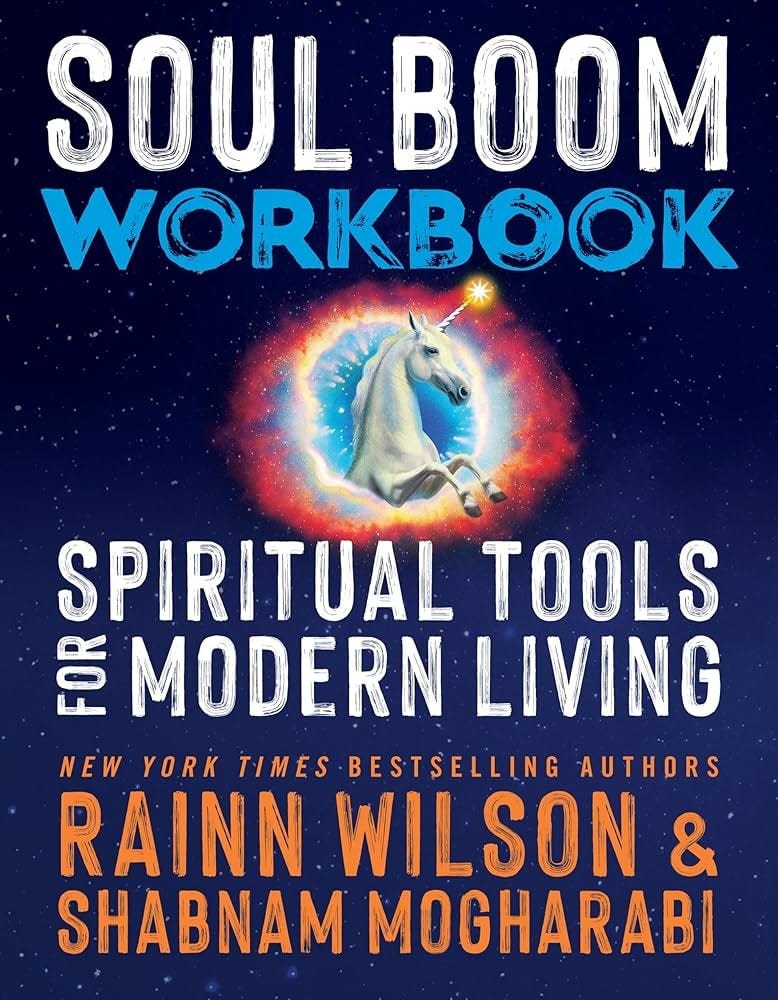
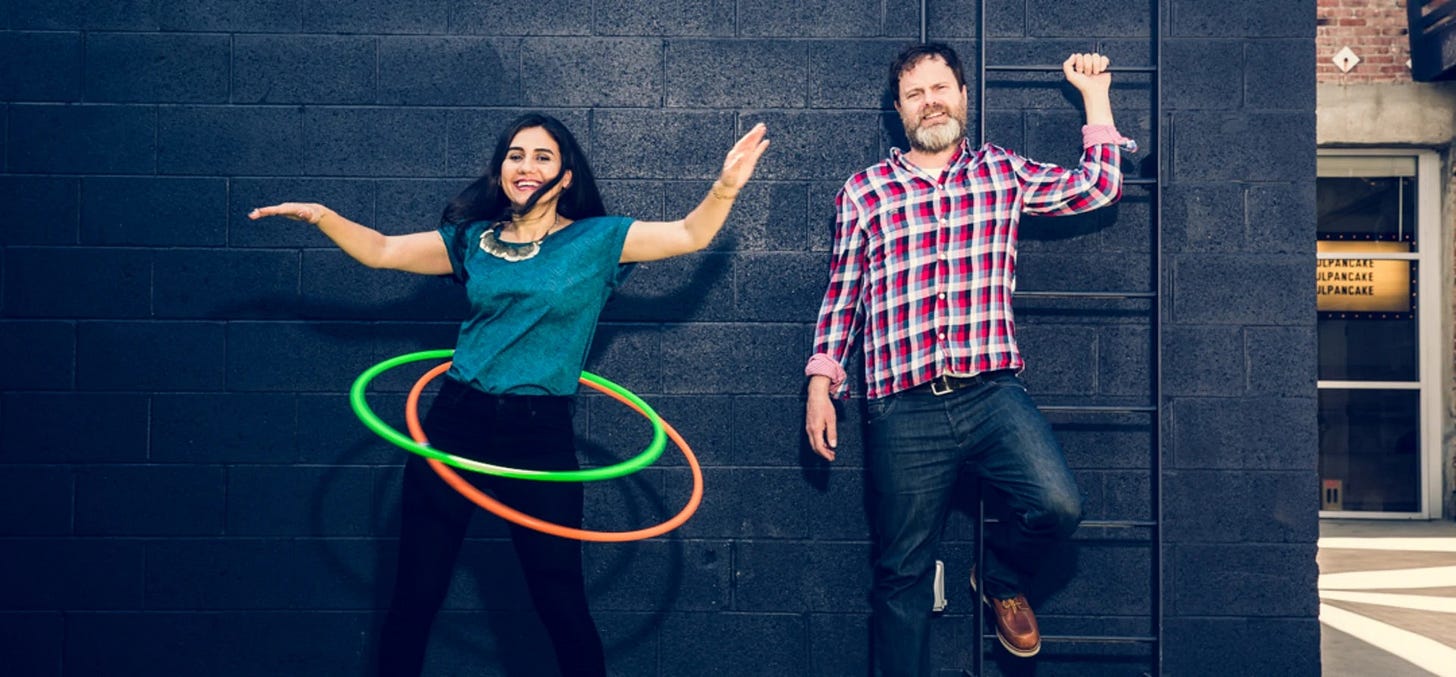
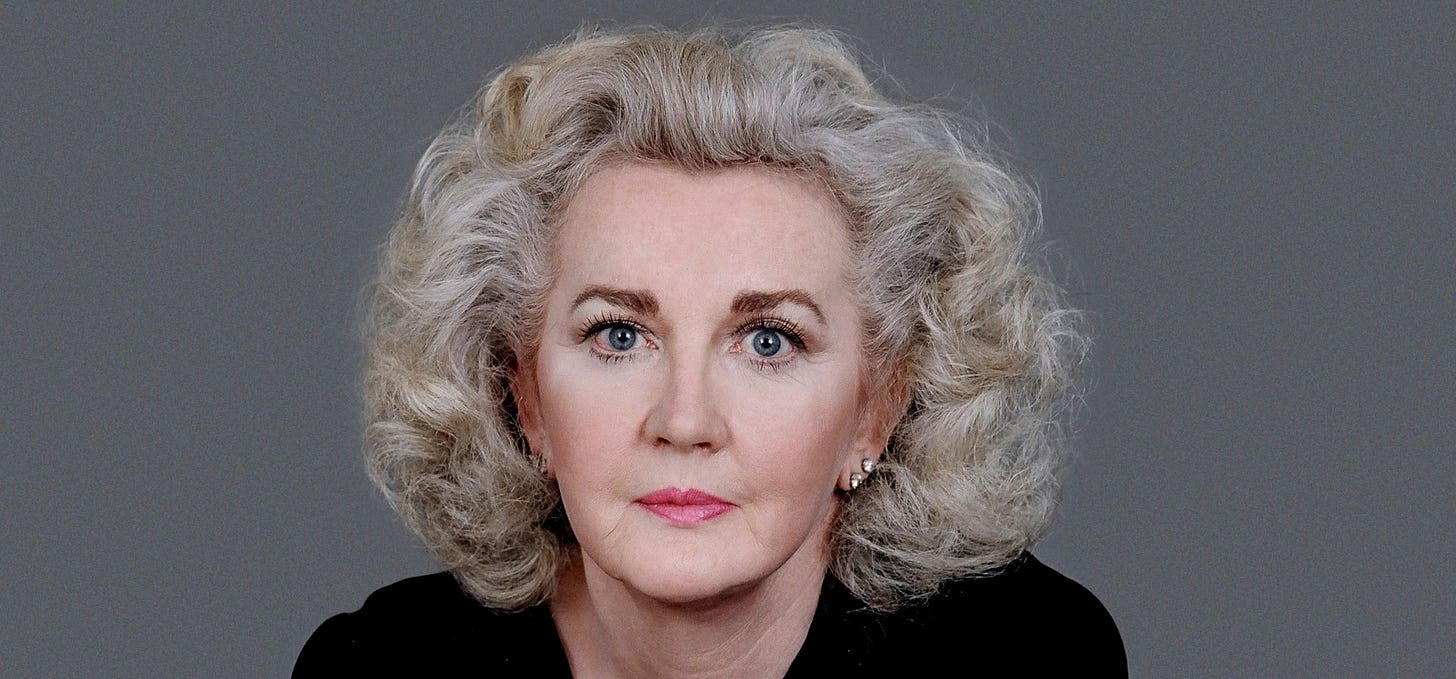
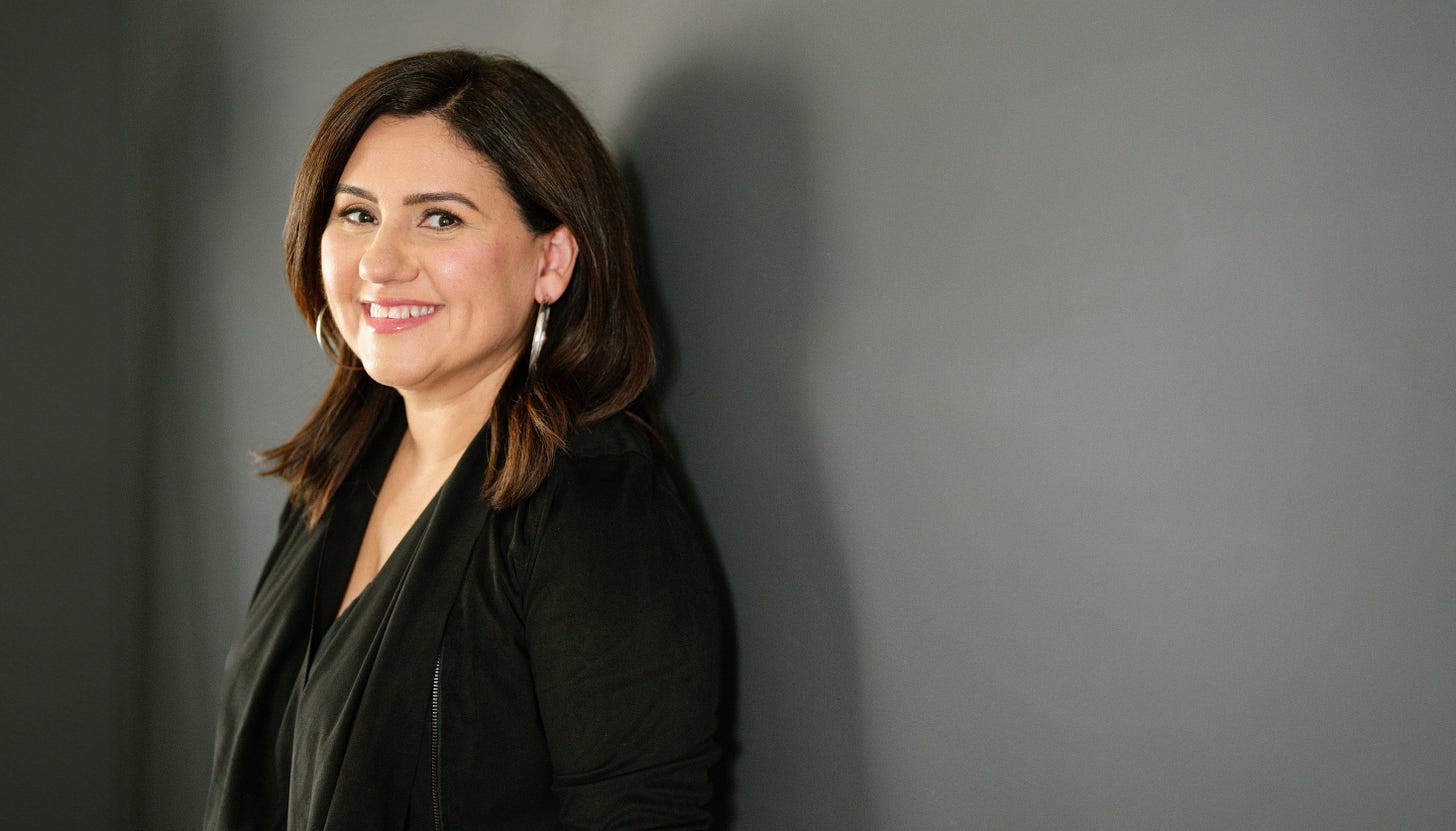
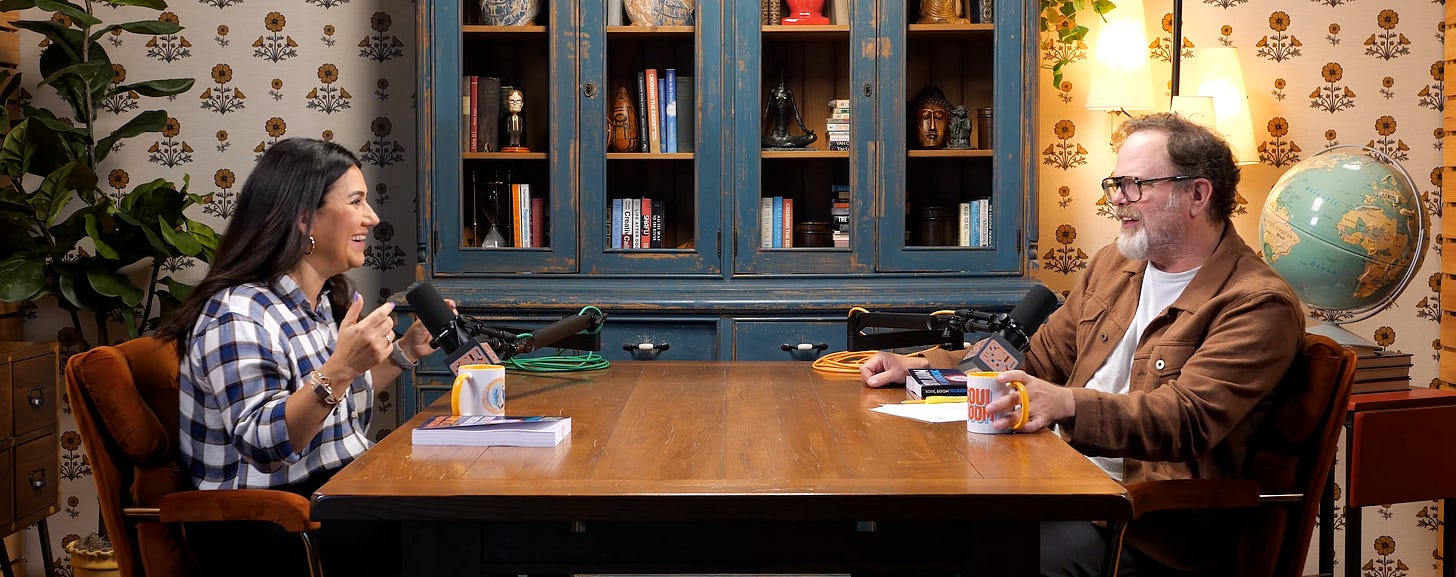


Just watched you on Morning Joe. I belong to A Writing Room writing collective. We try to follow an artist’s way and have for a few years. This sounds like the perfect adjunct for me. Finding beauty catching that flower growing in the crack and the right rock to treasure is vital to me. Thank you!
this was a lovely and thought provoking pod!